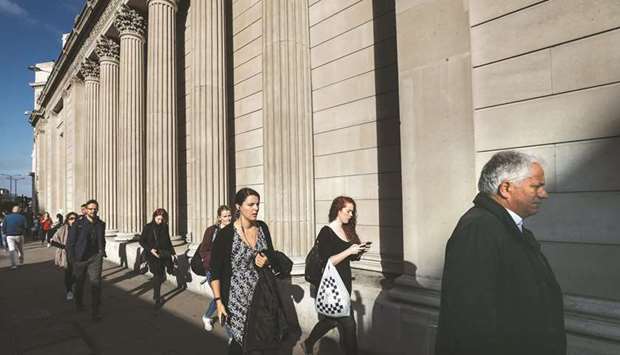British lenders need to hold around an extra £10bn ($13.5bn) in capital to guard against increased risks from rapidly rising unsecured consumer lending, the Bank of England said yesterday.
British consumer borrowing is growing at nearly 10% a year, far faster than incomes, and the BoE’s Financial Policy Committee said it would tell banks by the end of the year how much extra capital to hold, based on the riskiness of their lending.
Policymakers also warned that Britain’s upcoming departure from the European Union in March 2019 posed big legal problems for about a quarter of derivative contracts, which businesses use to hedge against interest rate and currency risks.
Financial firms would need to redraft cross-border contracts to avoid disruption to markets, though a better solution would be for British and EU legislators to pass a law to allow existing contracts to run their course, the BoE said.
On consumer credit, the central bank said that in a crisis situation — with unemployment more than doubling and the BoE’s interest rate spiking to 4% — British lenders should expect to write off 20% of their loans.
This compares with 13% last year, when banks’ loan quality was higher and the BoE tested it against a lower interest rate scenario.
Most economists expect the BoE to raise interest rates to 0.5% from 0.25% in November.
The extra 10bn pounds is small in the context of the 280bn pounds of core capital held by British lenders, but the BoE said it expected banks to take the greater risks into account in their future lending plans.
“Lenders overall are placing too much weight on the recent performance of consumer lending in benign conditions as an indicator of underlying credit quality. As a result, they have been underestimating the losses they could incur in a downturn,” the BoE said in a statement.
Unsecured lending to British consumers is growing at nearly 10% a year, not far off an 11 year high of just under 11% reached in late 2016.
The BoE said this represented “a pocket of risk” but that overall lending growth, including mortgages, was in line with historic norms.
The central bank has previously dismissed the idea that growth in British consumer demand is primarily based on rapidly rising borrowing.
British households have been squeezed by a sharp pick-up in inflation since the start of the year, which has eroded households’ incomes, and the BoE expects inflation to reach its highest in more than five years next month.
At its last meeting in June, the FPC brought forward a requirement for banks to explain how they would cope with heavy consumer lending losses, and also started to increase the risk buffers banks must hold against cyclical downturns.
Consumer lending growth slowed to an annual rate of 9.8% in July, its weakest since April 2016, after reaching its highest level in 11 years at just under 11% towards the end of 2016. In March the BoE said it was concerned that increased competition among lenders was leading to potential risks from things like longer interest-free periods on new credit cards and bigger unsecured personal loans.
The finance spokesman of the opposition Labour Party, John McDonnell, is due to call for a cap on credit card interest payments at his party’s annual conference later yesterday, so no one pays more in interest than the original amount borrowed.

Pedestrians walk past columns of the Bank of England building in London. British consumer borrowing is growing at nearly 10% a year, far faster than incomes, and the BoE’s Financial Policy Committee said it would tell banks by the end of the year how much extra capital to hold, based on the riskiness of their lending.
